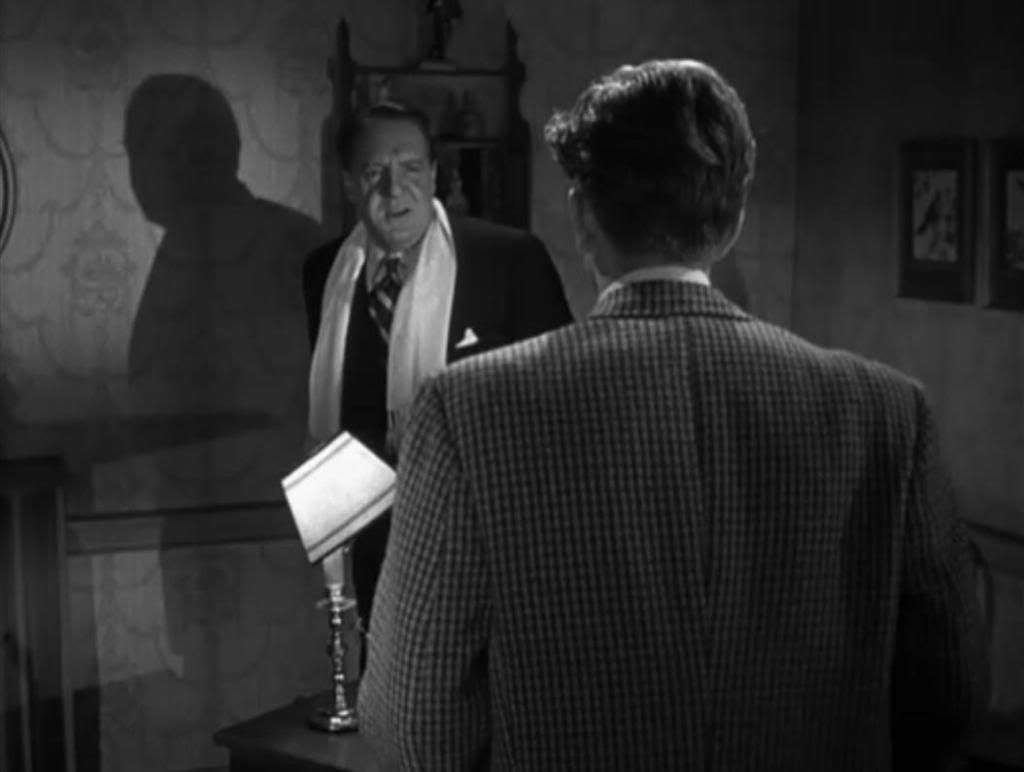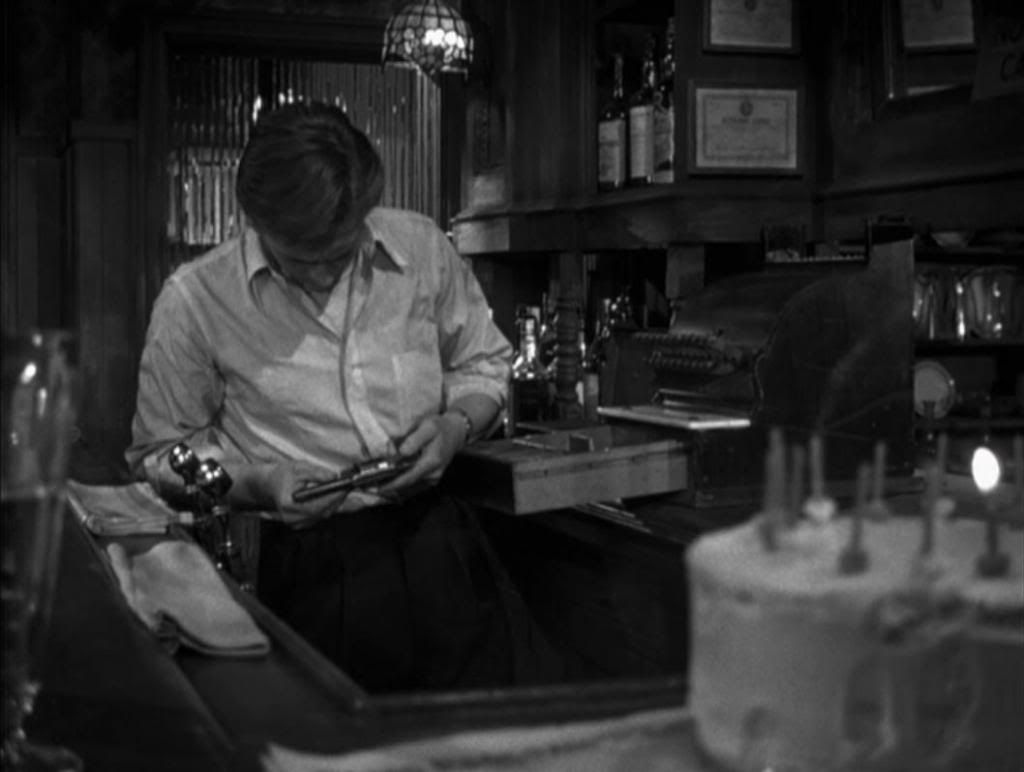
Joseph Losey's The Big Night is a coming of age tale in the guise of a noir, a thiller that's ostensibly about revenge but is actually about a teen's desperate struggle for sexual and emotional maturity. George (John Drew Barrymore) is a weak young guy, a loser who's always getting kicked around, who seems so much younger and more innocent than his age. In the film's opening scene, he's beaten up by a group of guys who taunt him, pushing him towards a girl they're hanging around with, telling her to kiss him, but she just pushes him away, dismissing him as too immature. All of this happens, much to George's humiliation, beneath the watchful eye of his stern, tough father (Preston Foster), who looks on but doesn't intervene or say a word. It's obvious that the weakling George feels overshadowed by his father, which has helped to keep him immature. The boyish George soon shakes off this beating and bounds into his father's bar, fresh from a haircut, rubbing his smooth cheeks and enthusing that the barber said he needed a shave.
He's eager to be a man, but he still acts like a boy and he's still treated like one by everyone. His father throws him a birthday party, bringing out a cake and singing to him. But George can't avoid the look of disapproval in his father's eyes when he fails to blow out all the candles on his birthday cake, as though that one candle left flickering was a sign of his unmasculine weakness. Losey then makes sure that, throughout the subsequent scenes, the cake is often highlighted in the corner of the frame, that candle still burning in the foreground, a reminder of that small failure. George's journey into manhood will commence when he sees his father get beaten up by the sportswriter Al Judge (Howard St. John); George's father obediently kneels down for a caning, which Judge delivers with savagery while George and the other bar patrons watch. George is horrified to see his father, his icon of masculinity, lowered like this, and when his father seems willing to simply shrug the incident off and forget it, George grabs a pistol and runs off into the night, determined to track down Judge and get his revenge.
Despite this strong premise, the film is surprisingly aimless, with George stumbling into the dysfunctional family drama of the alcoholic journalism professor Lloyd Cooper (Philip Bourneuf), Cooper's girlfriend Julie (Dorothy Comingore), and her younger sister Marion (Joan Lorring). This trio provides a sounding board for George's tortured musings about his immaturity and his confusion about his father, who'd he always looked up to but who had disappointed him so profoundly. Barrymore delivers a sweaty, histrionic performance that's over-the-top but appropriate to this whiny teenager. Still, his endless agonizing quickly becomes tiresome, and the middle section of the film gets bogged down with an abortive quasi-romance between George and the personality-free Marion.

The film's momentum recovers during George's long-delayed confrontation with Judge, in which the sportswriter reveals that things are much more complicated than George had guessed. It's a tense and powerful meeting, and Losey enhances the suspense with striking compositions in which the two men seem to be stalking around one another, their shadows elongated on the walls. The film's noirish atmosphere, courtesy of cinematographer Hal Mohr, is effective in general, rendering the spartan sets with a shadowy, low-budget minimalism that often makes it seem that George is wandering through a wasteland whenever he ventures outside. The interiors are appropriately dingy, too, as George passes through the city's seedy dive bars, nightclubs and fighting rings in his quest for revenge.
One curious moment stands out as a great scene with little to do with George's quest. At a nightclub, he hears a black singer who really impresses him, and after the show he approaches her at the curb outside the club, telling her how much he loved her singing and how beautiful he thinks she is. But then he adds, "even if you're...," trailing off before he makes the unspoken reference to her race. But she gets it anyway, of course, and it's heartbreaking the way Losey highlights her face in closeup, transitioning from her warm smile of pleasure at being complimented, to a wounded expression that's also a look of recognition. It's obvious that she's heard this before, maybe many times before, but she's still hurt to be hearing it again, and from such a seemingly earnest kid no less. It's a moment of sociopolitical engagement that has Losey's fingerprints all over it: it's entirely unnecessary to the narrative, except perhaps as more evidence of George's immaturity, but it stands out as one of the film's best scenes.
Its uneven performances and sometimes slack narrative aside, The Big Night is a raw and interesting noir that's notable for its emphasis on adolescent angst and sexual undertones. It was one three thrillers Losey made in 1951, his last year in Hollywood before his exile, and though it's a flawed film, not as interesting as The Prowler or his remake of Fritz Lang's M, there's enough substance here to make it worth seeing anyway.

2 comments:
Oh I thinks it's far more interesting than The Prowler and the high point of Losey's American career. Losey was packing his bags for europe even as he was making this film. It's as if he wanted to give HUAC a real reason for hating him. This is a throughgoing indictment of the United States of Amnesia (as Gore Vidal calls it) and everything it stands for. It was the very last film appearance by Dorothy Commingore (best knwn as Susan Alexander Kane) who the blacklist was in the process of destroying utrterly. Scriptwriter Ben Barzman too (who absconded to Europe as well.)
In Michel Ciment's Le Livre de Losey the great director mentions that years later John Drew Barrymore told him the FBI had approached him and ordered him to keep an eye on the director. Spy on him in fact. Barrymore told them nothing but the entire expeircme mortified him as Losey was being especially kind to him during the shooting (Barrymore being an especially troubled individual.) He's quite amazing in this film doing something that isn't quite acting -- save in the Warhol sense.
Recently his daughter Drew has been on TCM's "The Essentials" often making mention of how startling it is to see her own expressiosn in the faces of her grandfather John and Uncle Lionel. Not to mention Ethel. While her father wasn't present during the better part of her life Drew cared for him at the end of his.
I do hope she hosts a TCM screening of The Big Night
It's a fascinating film, for sure, and Barrymore is great in it, giving a pretty raw and unpolished performance as this struggling kid. And as in most of Losey's US noirs, you can really see his ideology showing through, making it easy to understand why HUAC was so intent on getting him.
I adore The Prowler, though.
Post a Comment